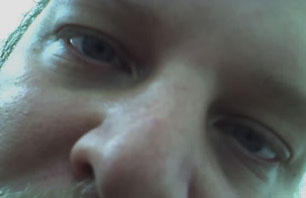Daily Verb"To feel pleased"ยิน yin
yin
"To know (of)"รู้จัก ruû-jăk
ruû-jăk
Daily Noun"I (male)"ผม phóhm
phóhm
"I (female)"ฉัน chán
chán
"You"คุณ khoon
khoon
"He, She, They"
เขา kháo
kháo
"We"เรา rao
rao
"Thing"ของ khaáwng
khaáwng
"Luck"โชค chòhk
chòhk
Daily Adjective"Well, Good"ดี dee
dee
"Well, Happy"สบาย să baay
să baay
"Tired"ง่วง nguàang
nguàang
"Hungry"หิว hiú
hiú
"Full (food)"อิ่ม ĭm
ĭm
Daily Other Word"Hello"สวัสดี săwăt dee
săwăt dee
"Thank you"ขอบคุณ khaăwp khoon
khaăwp khoon
Daily Thainglish"Bye Bye"บ๊ายบาย baây baay
baây baay
 yin
yin"To know (of)"รู้จัก
 ruû-jăk
ruû-jăkDaily Noun"I (male)"ผม
 phóhm
phóhm"I (female)"ฉัน
 chán
chán"You"คุณ
 khoon
khoon"He, She, They"
เขา
 kháo
kháo"We"เรา
 rao
rao"Thing"ของ
 khaáwng
khaáwng"Luck"โชค
 chòhk
chòhkDaily Adjective"Well, Good"ดี
 dee
dee"Well, Happy"สบาย
 să baay
să baay"Tired"ง่วง
 nguàang
nguàang"Hungry"หิว
 hiú
hiú"Full (food)"อิ่ม
 ĭm
ĭmDaily Other Word"Hello"สวัสดี
 săwăt dee
săwăt dee"Thank you"ขอบคุณ
 khaăwp khoon
khaăwp khoonDaily Thainglish"Bye Bye"บ๊ายบาย
 baây baay
baây baayThe letters for today are a little tough, so sorry in advance. Let's look at the first word for hello, which actually means blessing: "Sawat": (สวัส). Notice that the first and last letters are the same? That's because this letter ส at the beginning of a word is an "S", and when it is at the end of a word, it is a "T". I know that seems absolutely crazy but think about these two words: "GHost" and "rouGH". Fair enough?
The next letter is the W in "Sawat", ว
Now for the really fun consonant: "AW", อ, which has shown up in the number two (สอง, saáwng). However, notice the following odd words that you have already learned where there seems to be no "AW": อยาก, yaăk, "to want to"; อยู่, yuŭ, "to stay"; อะไร, ă-rai, "what?", and today's word, อิ่ม, ĭm, "full". The reason there is an AW in these words is because in the Thai language, you can't have a syllable without a consonant in it, and/or you can't have a word start with a vowel. Therefore, the letter อ is chosen as the letter that is kind of a "space filler" for the Thai language. Well, English is full of enough silent letters that we can't complain.
The vowel for today is also from "sawat", and is the letter -ั (a short "A"). There are a bunch of short A's, and this is only the first one you'll learn.
Today's first verb is ยิน, "yin" or, "to feel pleased". This is a verb that is used in conjunction with two other words for today: รู้จัก, "ruû-jăk", "to know", and ดี, "dee" or, "good". Put them together another word you already know: ที่, "theè", which means "at" or "in", and you can almost create a great sentence: "ยิน ดี ที่ ได้ รู้จัก" ("yin dee theè daì ruû-jăk", or "Happy to be knowing [you]").
Next up is all of the Thai pronouns you need to know for now. However, be aware that there are just dozens of pronouns for when you are speaking to different people. Monks have their own word for "I", government officials have their own word for "you", and you don't call your wife the same "you" as you call your best friend.
That said, for the time being, the word for "I" if you are a male is phóhm, which is consequently, the same word as "hair". (This is because way back in the olden days, people would show respect by saying to others, "the hair of my head speaks to the bottom of your feet"... which was eventually just shortened to "phóhm".) If you are a female, then you don't say "phóhm", you say "chán" instead.
When you are referring to another person ("you"), you say "khoon" for you (in all instances: As a foreigner speaking Thai, don't worry... you'll be excused for now). When you are referring to "we", you use "rao", and for all third person pronouns, you use "kháo". The nice thing is that all direct objects are the same as the pronouns... thus him is the same as he; her is the same as she; them is the same as they; and, us is the same as we. (To creat the possessive (his, her, their, our, my, your), just put the word "thing" in front of it ("rôt khaáwng phóhm" = my car).
The word "dee" is the word for "good", but only in the upbeat, feeling way. You can't say "the food is good" or "you dance good". Those are other words for another lesson.
The words să baay ("well"), nguàang ("tired"), hiú ("hungry"), and ĭm ("full") are adjectives, but the "to be" that would come before them in English is understood and omitted in Thai. Therefore, in order to say "I'm tired", you would say, "phóhm nguàang". If you wanted to say "Are you hungry?", you would say, "khoon hiú maí".
The word "săwăt" means blessing, and if you add "dee" to it, you get "săwăt dee", which means "hello". (Remember to always add "khrâp" or "khà" after your sentences.) The word "khaăwp khoon" is "thank you". As above, add "khrâp" or "khà".
There are a lot of ways to say good bye in Thai, but you can just stick with the simple "baây baay" for now, or just say "chòhk dee" ("good luck"), and as always, add "khrâp" or "khà".




No comments:
Post a Comment